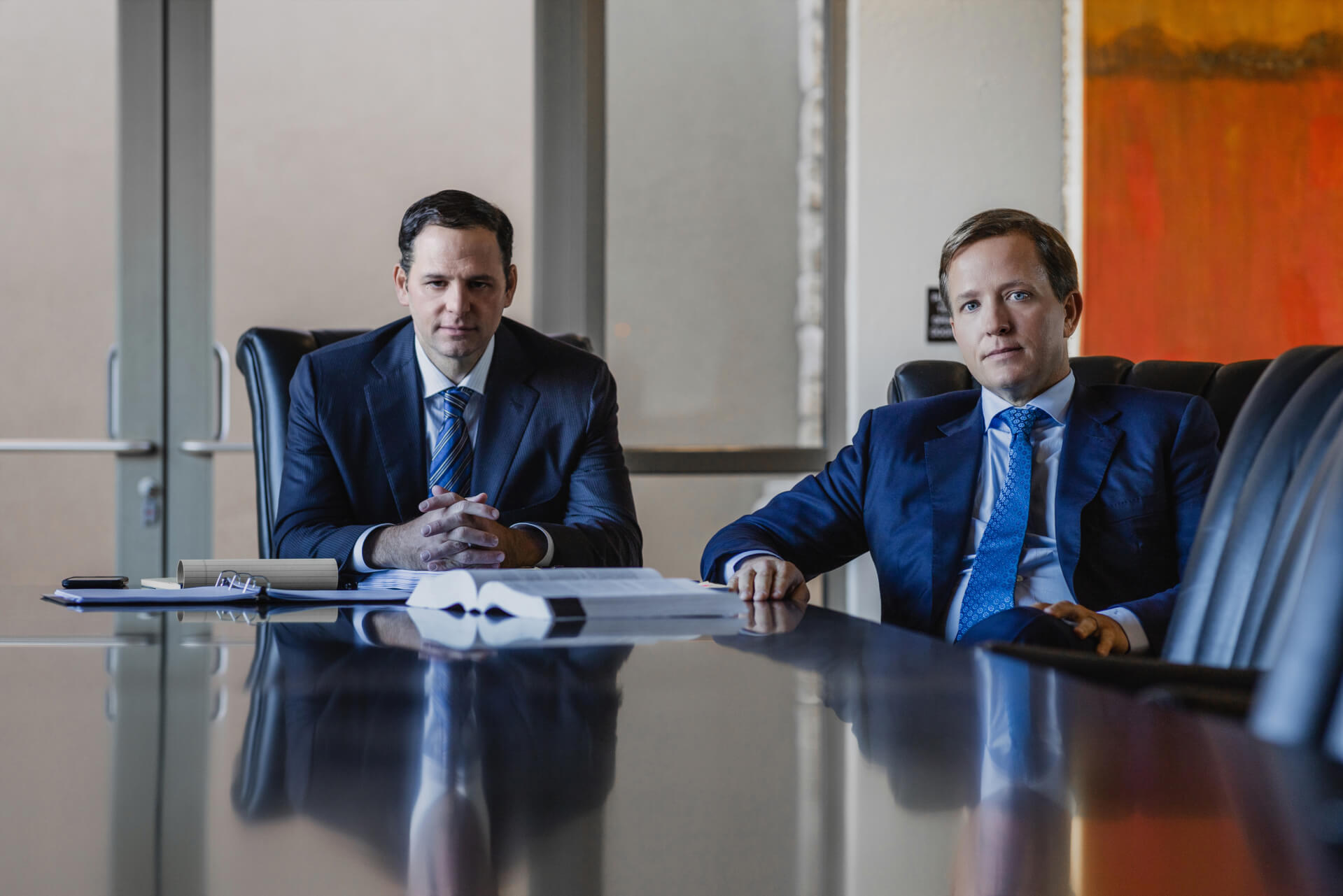Helping Injured Offshore Workers Get the Best Results
Anywhere there’s navigable water, there are offshore workers giving their all to make a living. Deckhands, oil and gas employees, and other workers are exposed to dangerous conditions every day. Companies know of these dangers and are obligated to protect their employees. Yet, they often fail. When a preventable accident shatters workers’ lives and the company fails to do what’s right, Arnold & Itkin is there to help.
Workers call when their lives are at stake and only the best attorney will do. Delivering results is more than just our job—it’s our calling.
We’ve helped clients after devastating events across the globe, including oil rig explosions and fires, dredging accidents, diving accidents, vessel collisions, crane failures, and more. From the Jones Act to the Longshore and Harbor Workers' Compensation Act, we know maritime law and are here to help. We represent clients from our offices in Houston, Dallas, Midland, San Antonio, Baton Rouge, and beyond.
If you’ve been hurt in an offshore accident, call the offshore injury lawyers at Arnold & Itkin. When the other side isn’t being fair, we fight back. When oil and gas companies aren’t truthful, we catch their lies. When workers need results, our team of offshore injury attorneys works tirelessly to make sure they get them. No matter what.
Abogados de lesiones por accidentes marítimos y en alta mar en Houston
Trusted Nationwide for Catastrophic Offshore Accidents
Offshore workers face a unique set of challenges, operating in an environment that combines potential physical hazards with the unpredictability of natural elements. From shifting weather patterns to mechanical failures, every day presents new risks. Despite these challenges, companies often prioritize profit over safety, leading to inadequate training, faulty equipment, and poorly maintained work sites. In an industry where a single oversight can lead to catastrophic outcomes, accountability is crucial. Arnold & Itkin steps in decisively when companies fall short, ensuring that justice is served and workers' rights are upheld in the face of adversity.
When scenes of chaos in the maritime industry are on the news, our phones start to ring. Whether someone needs help after an oil rig disaster, or their vessel was involved in a collision, we’re there for those facing headline-making circumstances.
When the Deepwater Horizon exploded, we refused to let some of the largest companies in the world shift blame to its crewmembers. When the El Faro sailed into a hurricane and sank, we were there to make sure the company made things right.
Neither process was simple, but both cases ended how they should have: with the injured and grieving receiving the fair compensation that they needed. With some of history’s largest personal injury victories, our firm is here to make sure big companies treat regular people right. We’re here to help you win.
Our commitment extends beyond just winning verdicts; it's about holding industries accountable for past and ongoing negligence. We understand that offshore accidents not only devastate individual lives but can also highlight systemic issues within maritime operations. By addressing these broader concerns, Arnold & Itkin plays a pivotal role in driving industry change, ensuring safer workplaces for all. With every case, we strive not only to secure compensation but also to instill a culture of responsibility and prevention in maritime workers' honor.
Offshore Injury Attorneys Recognized by Clients & the Industry
There isn’t an oil corporation or maritime company that we haven’t been able to effectively face or outwork. With attorneys who are recognized nationally by Forbes, Super Lawyers, and Best Lawyers, we have repeatedly and successfully demanded justice on behalf of injured offshore workers and their families, and for decades we’ve been highly recommended by the people we’ve helped.
Whether you’re looking at our track record, our prestigious memberships in The Inner Circle of Advocates, or The National Association of Distinguished Counsel, there’s no better testament to the representation we provide than our own clients. By looking at our Google reviews, you can see that our legal advocates have been relied on by people in some of the toughest times of their lives, and we’ve been able to help them move forward and rebuild.
Here are just some of the life-changing recoveries we’ve won for offshore workers and their families:
- $68 million won for a Texas offshore worker injured in pipeline explosion.
- $29 million won in the largest known settlement for an offshore wrongful death.
- $16.9 million jury verdict in Harris County, TX for an injured Jones Act seaman.
- $14 million settlement for tugboat workers hurt in explosion off the Texas coast.
- $11.8 million settlement for family of barge worker killed in explosion off the Texas Gulf Coast.
Supporting Houston Workers After Severe Oil Rig Accidents
In Houston, where the energy sector is a major economic driver, oil rig accidents are a stark reality for those working on and near navigable waters. Arnold & Itkin is committed to supporting Houston’s offshore workers who face hazardous conditions daily. Despite companies’ knowledge and obligation to maintain safety, failures occur, leading to preventable, life-altering accidents. Our Houston oil rig accident attorneys stand ready to advocate for workers when companies neglect their duty of care, ensuring those affected receive the justice and compensation they rightfully deserve.
When facing the aftermath of catastrophic oil rig accidents, Houston's maritime workers can find the experienced legal help they need with Arnold & Itkin. Our experience spans a global clientele, with a strong focus on helping those in Houston navigate the aftermath of oil rig explosions, fires, and other maritime incidents under laws such as the Jones Act and the Longshore and Harbor Workers' Compensation Act.
We’re not just fighting for compensation; we’re fighting for the dignity and future of every client, holding powerful companies accountable for their actions or inactions.
Our dedication has seen us through challenging battles against some of the biggest names in the industry, always with the goal of securing fair treatment and compensation for the injured and grieving. Our commitment to injured offshore workers is unwavering, driven by a deep understanding of maritime law and a relentless pursuit of justice. If you’ve suffered from an oil rig accident, our team of experienced offshore injury attorneys is prepared to fight tirelessly for the best results possible.
Understanding Houston's Maritime Climate Challenges
Houston's maritime industry faces unique climate challenges that can exacerbate offshore work risks. The Gulf of Mexico is notorious for its severe weather patterns, including hurricanes, tropical storms, and high winds. These conditions can lead to hazardous working environments, increased likelihood of accidents, and the need for rigorous safety protocols. Offshore operators must be prepared for these potential threats, which can disrupt operations and endanger crew safety. Companies have a legal obligation to employ advanced monitoring systems and have robust evacuation plans in place to ensure the welfare of their workers.
At Arnold & Itkin, we understand the intricate dynamics of Gulf Coast weather patterns and how they intersect with workplace safety. We hold companies accountable when they fail to adapt adequately to environmental risks, leading to preventable accidents. By focusing on operations specific to Houston’s geographical and climatic challenges, we ensure our clients' cases are viewed with the accuracy and context they deserve.
Take the Right Steps After an Offshore Injury
The immediate aftermath of an offshore injury is crucial for securing your health and legal rights. First, seek medical attention to address any urgent health concerns. Document the incident meticulously by recording details, taking photographs, and collecting witness statements if possible. Report the injury to your supervisor and ensure it is officially logged. It's also vital to consult with an offshore injury attorney promptly. At Arnold & Itkin, we can provide you with actionable steps to protect your interests and pursue any potential claims against liable parties.
The complexities of offshore law make it crucial for affected workers to have strong legal representation. Navigating the Jones Act, the Outer Continental Shelf Lands Act, and other maritime statutes requires a depth of knowledge and strategic approach that only seasoned attorneys, like those at Arnold & Itkin, can provide. We ensure that our clients do not just receive a settlement, but equitable compensation that reflects the full extent of their suffering and loss. Empowering our clients with information and legal support, we equip them to face the challenges brought on by negligent acts decisively.
Types of Common Offshore Accidents
Whether massive corporations like Valaris, Schlumberger, or other employers were involved, or the accident took place in the Houston Ship Channel/Port Houston, the largest port in the state, Arnold & Itkin has the experience and resources to help you. From incidents in Freeport and Galveston to oil rigs offshore, our Houston offshore injury attorneys can secure answers and demand justice for you.
Offshore Fires & Explosions
Because of the combustible nature of drilling, offshore rigs are at significant risk of fires and explosions. While these types of events occur infrequently, they are usually the most catastrophic type of offshore accident. One of the most notable explosions occurred in 2010 when the blowout preventer on the Deepwater Horizon oil rig failed. The ensuing explosion killed 11 workers and injured dozens more. Fires or explosions can also be caused by poorly maintained pipelines, improperly stored fuel, or collisions between multiple vessels. These incidents are no light matter.
After an explosion, the vessel may sink. A fire can be equally as damaging and may quickly spread across the entire offshore platform, trapping workers and leaving no room for escape.
Oil Rig Injuries
Offshore oil drilling is dangerous work. The complex equipment needed to drill at such depths is a primary source of hazards. Additionally, most companies do not have the experience drilling offshore that they do with onshore oil rigs. The complexity of offshore drilling combined with the lack of experience increases the chances of an accident occurring on the rig. According to data from the U.S. Minerals Management Service (the federal agency that regulates offshore activity), a significant percentage of offshore accidents are caused by human error.
Oil rig operations demand attentive and detailed protocols to ensure worker safety, yet high turnover and long shifts can lead to fatigue, increasing the likelihood of errors. Furthermore, offshore drilling often occurs in challenging environments, where weather and natural elements complicate operations. Addressing these conditions requires not only robust training programs but also a culture that prioritizes safety over speed and efficiency. We are here to support those impacted by injuries from these perilous conditions, offering a path to justice and restitution.
Deck Accidents
The deck has a lot of activity. Workers who are not careful could be struck by heavy equipment, slip on a wet surface, or fall off an unsecured ladder. Additionally, a sudden movement of the ship or vessel could cause workers to lose their balance, resulting in back or head injuries.
Equipment Failure
Equipment on offshore vessels presents a number of hazards to the workers who are operating the machinery. Limbs can get caught in dangerous parts of the equipment, workers can be pinned underneath a heavy load, or they can be burned or shocked by active equipment.
Equipment failure is almost an inevitable part of life on offshore vessels, but it shouldn't be. Regular maintenance and timely upgrades are critical to avoiding equipment malfunctions that jeopardize safety. Our firm targets these oversights, advocating for the rights of employees subjected to faulty and dangerous machinery. We emphasize accountability for maintenance failures and push for comprehensive safety audits to protect future workers from similar dangers. Safety should always be a priority, ensuring that equipment is inspected regularly to meet standard safety requirements.
Weather-Related Accidents & Capsizing
While it's true that offshore companies cannot control the weather, they can protect their crew from storms that they know are coming. Tropical storms and hurricanes present a serious hazard for offshore workers and increase the risk of accidents and even capsizing. This happened to the El Faro, a cargo ship that went down with her entire crew on October 1, 2015, after she steamed straight into the path of Hurricane Joaquin. The entire 142-man crew of the Globetrotter II was left to weather Hurricane Ida in September of 2021, and though no lives were lost, the vessel nearly capsized 3 times and everyone on board thought they were going to die.
In extreme weather, advanced precautionary measures and robust emergency protocols can make a significant difference in safeguarding lives. It is imperative for companies to invest in high-level forecasting tools and make informed decisions regarding offshore operations and evacuations during adverse weather forecasts. We insist on heightened responsibility and preparedness from all offshore operators, emphasizing their duty to minimize risk to seafarers.
Barge & Tugboat Injuries
Tugboats need to be extremely powerful to assist barges back to shore. However, along with their power comes an added risk of injury. Working on a tugboat is increasingly dangerous while the boat is attached to a barge.
Some of the most common accidents on tugboats and bargesinvolve:
- Tow lines parting
- Handling heavy lines and shackles
- Equipment failure
- Crew negligence
- Slippery decks
- Falls overboard
When these incidents injure workers or claim their lives, our Texas offshore accident attorneys stand ready to protect their interests.
Common Causes of Offshore Injuries
At Arnold & Itkin, we recognize that offshore injuries can be debilitating to the victim. We also know that no two offshore cases are the same. Should you choose to work with our legal team, you will be able to rest assured knowing you will have an advocate on your side who is deeply knowledgeable about all areas of maritime law.
No matter the reason for the offshore accident that caused you harm, you can trust that we will go the distance in our efforts to protect you and your family. We handle cases involving:
Distracted Mariners
Shipping accidents on navigable waters may occur because the navigator of a ship or crew is distracted by a cell or other wireless device. Just as phones and texting can distract drivers on the highway, wireless devices can lead to serious accidents at sea, including collisions and groundings. The U.S. Coast Guard recently issued a safety advisory warning the industry of the risk of using cell phones and other wireless devices while operating a vessel.
Understanding the potential ramifications of negligent distractions is vital. Our firm focuses on the broader issue of safety culture and training on vessels to highlight the importance of maintaining attention and having clear operational communication. Addressing these issues requires a commitment to creating policy changes onboard that strictly limit wireless device usage, particularly during critical navigational tasks.
Ships & Cell Phone Use
The Coast Guard strongly recommends ship owners and operators develop policies regarding the appropriate use of cell phones and wireless devices while on duty. When mariners are navigating a ship, the use of wireless devices unrelated to the task at hand may cause lapses of attention, disrupt the exchange of information, and lead to serious offshore accidents involving injuries and fatalities. Similarly, full attention and active communication are demanded when crew members are loading or unloading cargo, taking on fuel or other hazardous activities.
The National Transportation Safety Board has found that the use of cellphones and other mobile communication devices can slow response times, hinder performance, and increase attention lapses of those in safety-sensitive positions. All crew members are supposed to act as lookouts for potential accidents aboard ship. In two recent investigations, the NTSB determined that Coast Guard crew were engaged in texting or cell phone conversations unrelated to work at the time of two offshore collisions involving patrol boats that left 1 child dead and 10 injured.
The casual use of a cell phone or wireless device by a co-worker or crew member before a serious offshore accident may reflect a lack of proper supervision or lack of attention to safety and may be evidence of negligence. The Coast Guard has said it now recognizes the hazard of distracted mariners and says offshore employers should work to reduce preventable accidents.
Understanding Offshore Accidents: Fault & Compensation
Determining fault in an offshore accident typically involves a thorough investigation of the incident's circumstances. Factors such as employer negligence, equipment maintenance issues, and adherence to safety regulations are examined to establish liability. The Jones Act plays a critical role in such evaluations, as it only requires showing that employer negligence played any part in the injury, making it relatively advantageous to the seaman.
Witness statements, inspection reports, and safety records are often used to substantiate claims of negligence or unsafe work environments. Having an experienced attorney is crucial in meticulously documenting and arguing these factors, providing you with the best chance of securing favorable results in your claim.
Compensation for offshore accident injuries can include medical expenses, lost wages, pain and suffering, and in some cases, punitive damages. Depending on the circumstances of your accident, you may be eligible for claims under the Jones Act, which permits injured seamen to claim damages due to negligence. Alternatively, the Longshore and Harbor Workers’ Compensation Act may provide coverage for certain maritime workers not covered by the Jones Act.
Understanding the full extent of potential compensation requires an experienced attorney familiar with maritime law to evaluate your situation and assert your legal rights. Don't let the complexity of legal processes deter you from pursuing deserved compensation—our team is here to offer thorough guidance.
We’re Prepared to Do the Work It Takes to Change Lives
Whether someone needs help after an explosion out at sea, a collision in a channel, or an accident on a dock, our firm is ready to help. While every offshore injury case is different, one thing is true for every claim: accident survivors and their families deserve compensation from the people and companies that harmed them. We’re experienced with maritime law and have helped clients after all types of offshore injuries. When we take a person's case, it means that we’re dedicated to investigating their accident, seeking accountability, and fighting for the results they deserve.
When we help someone, we’re committed to getting results, regardless of how long it takes. Whether it takes months or years, we don’t give up. While some firms dread difficult cases and are prepared to accept a cheap settlement as quickly as possible, we’re not afraid of the fight. We know dedication and commitment are the only things that produce true results for clients, and we know results matter.
To discuss your rights and options with a Texas offshore injury lawyer, call (888) 493-1629or fill out our online contact form.

























